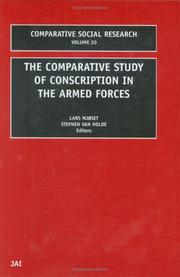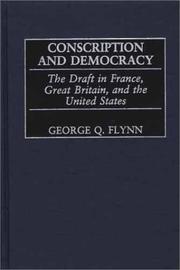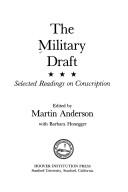| Listing 1 - 10 of 33 | << page >> |
Sort by
|

ISBN: 0817925716 Year: 1976 Publisher: Stanford The Hoover Institution Press
Abstract | Keywords | Export | Availability | Bookmark
 Loading...
Loading...Choose an application
- Reference Manager
- EndNote
- RefWorks (Direct export to RefWorks)
Draft --- -Compulsory military service --- Conscription, Military --- Military conscription --- Military draft --- Military service, Compulsory --- Military training, Universal --- Selective service --- Service, Compulsory military --- Universal military training --- National service --- Recruiting and enlistment --- Conscientious objectors --- Bibliography --- Bibliography. --- -Bibliography --- Compulsory military service

ISBN: 9781849501316 1849501319 0762308362 Year: 2009 Publisher: Bingley Emerald Group Publishing Limited
Abstract | Keywords | Export | Availability | Bookmark
 Loading...
Loading...Choose an application
- Reference Manager
- EndNote
- RefWorks (Direct export to RefWorks)
Polemology --- Internal politics --- Draft --- Compulsory military service --- Conscription, Military --- Military conscription --- Military draft --- Military service, Compulsory --- Military training, Universal --- Selective service --- Service, Compulsory military --- Universal military training --- National service --- Recruiting and enlistment --- Conscientious objectors

ISBN: 031331912X 9780313074196 0313074194 Year: 2002 Publisher: Westport, Conn. Greenwood Press
Abstract | Keywords | Export | Availability | Bookmark
 Loading...
Loading...Choose an application
- Reference Manager
- EndNote
- RefWorks (Direct export to RefWorks)
Draft --- Compulsory military service --- Conscription, Military --- Military conscription --- Military draft --- Military service, Compulsory --- Military training, Universal --- Selective service --- Service, Compulsory military --- Universal military training --- National service --- Recruiting and enlistment --- Conscientious objectors --- History

ISBN: 0817975810 Year: 1982 Volume: 258 Publisher: Stanford Hoover Institution Press
Abstract | Keywords | Export | Availability | Bookmark
 Loading...
Loading...Choose an application
- Reference Manager
- EndNote
- RefWorks (Direct export to RefWorks)
Conscriptie
---
Conscription [Military ]
---
Dienstplicht
---
Draft [Military ]
---
Exemption from military service
---
Military draft
---
Military service [Compulsory ]
---
Military training [Universal ]
---
Selective service
---
Service [Compulsory military ]
---
Service militaire obligatoire
---
Draft
---
-#BIBC:ruil
Book
ISBN: 9023220528 Year: 1984 Publisher: Assen Van Gorcum
Abstract | Keywords | Export | Availability | Bookmark
 Loading...
Loading...Choose an application
- Reference Manager
- EndNote
- RefWorks (Direct export to RefWorks)
Analysis of the motivation of youth to fullfill the military service or to resign.
Draft --- 812 Ideologie --- 843 Middenveld --- 848 Demografie --- 860 (Vredes)cultuur --- 876.1 Defensie --- 884.4 West-Europa --- Compulsory military service --- Conscription, Military --- Military conscription --- Military draft --- Military service, Compulsory --- Military training, Universal --- Selective service --- Service, Compulsory military --- Universal military training --- National service --- Recruiting and enlistment --- Conscientious objectors
Book
ISBN: 9025701566 Year: 1972 Publisher: Haarlem Gottmer
Abstract | Keywords | Export | Availability | Bookmark
 Loading...
Loading...Choose an application
- Reference Manager
- EndNote
- RefWorks (Direct export to RefWorks)
#GROL:SEMI-323.25 --- Draft --- Sociology, Military --- Military sociology --- Compulsory military service --- Conscription, Military --- Military conscription --- Military draft --- Military service, Compulsory --- Military training, Universal --- Selective service --- Service, Compulsory military --- Universal military training --- Armed Forces --- Armies --- Peace --- War --- War and society --- National service --- Recruiting and enlistment --- Conscientious objectors
Book
ISBN: 917346385X Year: 2000 Publisher: Göteborg Acta universitatis Gothoburgensis
Abstract | Keywords | Export | Availability | Bookmark
 Loading...
Loading...Choose an application
- Reference Manager
- EndNote
- RefWorks (Direct export to RefWorks)
Ability --- -Draft --- -Abilities --- Aptitude --- Proficiency --- Skill --- Skills --- Talent --- Talents --- Expertise --- Compulsory military service --- Conscription, Military --- Military conscription --- Military draft --- Military service, Compulsory --- Military training, Universal --- Selective service --- Service, Compulsory military --- Universal military training --- National service --- Recruiting and enlistment --- Conscientious objectors --- Testing --- -Ability --- Draft --- -Testing --- Abilities
Book
ISBN: 9781780526386 9781780526393 1780526393 1780526385 1283936488 9781283936484 Year: 2012 Publisher: Bingley, U.K. Emerald
Abstract | Keywords | Export | Availability | Bookmark
 Loading...
Loading...Choose an application
- Reference Manager
- EndNote
- RefWorks (Direct export to RefWorks)
This collection of sociological studies on the armed forces and conflict resolution deals with three types of developments the military is facing. First, the types of conflicts in which the military finds itself have become less predictable and more erratic, and hence, ways to respond are not easy to plan and organize. Apart from regular interstate warfare, the military nowadays is increasingly prepared to cope with irregular conflicts, such as terrorist threats and attacks, peacekeeping operations and indeed - warlike missions. Second, the economic conditions of many states are weakening. Citizens demand collective resources to be spent on care and cure, not conflict, therefore the way the military organizes and uses its resources to cope with the tasks they are set becomes increasingly important. Third, in most nations the conscript system has become history, and this creates new challenges in terms of recruiting volunteer soldiers. What becomes clear from the contributions to this volume is that the armed forces have to change their view of the world, the nature of conflicts and their profession greatly. Volume 19 of Contributions to Conflict Management, Peace Economic and Development presents the argument that the armed forces face a choice that will determine their position in society in times to come.
Military art and science --- Draft. --- History --- Economic aspects. --- Draft.History --- Political Science --- International relations. --- Compulsory military service --- Conscription, Military --- Military conscription --- Military draft --- Military service, Compulsory --- Military training, Universal --- Selective service --- Service, Compulsory military --- Universal military training --- National service --- Recruiting and enlistment --- Conscientious objectors --- Fighting --- Military power --- Military science --- Warfare --- Warfare, Primitive --- Naval art and science --- War --- Peace.
Book
ISBN: 1107326842 1107236274 1107332524 1107333288 1139177133 1107336600 1107334942 1107335779 9781107336605 9781139177139 9781107024984 1107024986 1299841961 9781107326842 9781107236271 9781107332522 9781107333284 9781107334946 9781107335776 Year: 2013 Publisher: Cambridge
Abstract | Keywords | Export | Availability | Bookmark
 Loading...
Loading...Choose an application
- Reference Manager
- EndNote
- RefWorks (Direct export to RefWorks)
The development of modern military conscription systems is usually seen as a response to countries' security needs, and as reflection of national political ideologies like civic republicanism or democratic egalitarianism. This study of conscription politics in France and the United States in the first half of the twentieth century challenges such common sense interpretations. Instead, it shows how despite institutional and ideological differences, both countries implemented conscription systems shaped by political and military leaders' concerns about how taking ordinary family men for military service would affect men's presumed positions as heads of families, especially as breadwinners and figures of paternal authority. The first of its kind, this carefully researched book combines an ambitious range of scholarly traditions and offers an original comparison of how protection of men's household authority affected one of the paradigmatic institutions of modern states.
Draft --- Heads of households --- Family heads --- Heads of families --- Households, Heads of --- Families --- Compulsory military service --- Conscription, Military --- Military conscription --- Military draft --- Military service, Compulsory --- Military training, Universal --- Selective service --- Service, Compulsory military --- Universal military training --- National service --- Recruiting and enlistment --- Conscientious objectors --- History --- Social aspects --- Heads of household --- Social Sciences --- Political Science
Book
ISBN: 162349169X 9781623491697 9781623491468 1623491460 Year: 2014 Publisher: College Station
Abstract | Keywords | Export | Availability | Bookmark
 Loading...
Loading...Choose an application
- Reference Manager
- EndNote
- RefWorks (Direct export to RefWorks)
Beginning in 1943, US Army leaders such as John M. Palmer, Walter L. Weible, George C. Marshall, and John J. McCloy mounted a sustained and vigorous campaign to establish a system of universal military training (UMT) in America. Fearful of repeating the rapid demobilization and severe budget cuts that had accompanied peace following World War I, these leaders saw UMT as the basis for their postwar plans. As a result, they promoted UMT extensively and aggressively.In Every Citizen a Soldier: The Campaign for Universal Military Training after World War II, William A. Taylor illustrates how army
Military education --- Draft --- Army schools --- Education, Military --- Military art and science --- Military schools --- Military training --- Schools, Military --- Education --- Compulsory military service --- Conscription, Military --- Military conscription --- Military draft --- Military service, Compulsory --- Military training, Universal --- Selective service --- Service, Compulsory military --- Universal military training --- National service --- Recruiting and enlistment --- Conscientious objectors --- History --- Study and teaching
| Listing 1 - 10 of 33 | << page >> |
Sort by
|

 Search
Search Feedback
Feedback About UniCat
About UniCat  Help
Help News
News